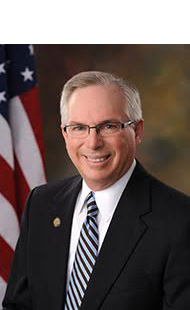
|
Kansas Scorched by Wildfires Legislative events took a backseat this week as our focus was on the tragedy unfolding out west. Wildfires spread across many areas of central and western Kansas, destroying homes, property, and livestock. Dry conditions combined with powerful, frequently-shifting winds turned the fires into the largest in Kansas history. Through Friday morning, 711,950 acres had burned. That equals 1148 square miles. Put another way, 1.4% of the land area of the entire state has now been consumed by the fires. There are no estimates yet on the loss of livestock and property. Clark County and the city of Ashland, Kansas were hit the hardest, with 85% of the county’s landmass having been burned. Through community, state, and federal efforts most of the fires have been contained. In Clark County, the fires are still the most active, but are calculated to be 70% contained. The fires in Reno, Ellis, and Rooks counties are all over 95% contained. Many Kansans have friends who have lost their homes and in some cases much more. My sympathies go out all affected by the fire, including my friends the McLean family in Ransom, Prose and Shroller families in Lane County, and Gardiner and Giles families in Clark County. Though recovery will be slow, the dedication of numerous volunteer firemen and countless offers of help have been overwhelming. This is Kansas at its worst and at its best – neighbors helping neighbors in times of difficulty. Resources for information and assistance for those affected by the fire:
Education/Gannon Ruling Article 6 of the Kansas Constitution outlines the state’s role in guaranteeing the fulfillment of each citizen’s right to public education. It is notable that the framers of our state constitution believed that public education was of such importance that its establishment comes directly after the organization of our system of government in Articles 1 through 5, which established the three branches of government, elections and suffrage. In Article 6, Section 6, Subsection (b) the constitution states “The legislature shall make suitable provision for finance of the educational interests of the state.” On March 2nd, the Kansas Supreme Court ruled on Gannon v. State of Kansas which dealt with public K-12 school finances. In 2015, Governor Brownback and the legislature repealed the K-12 school funding formula with the intention of developing a new system within 2 years. For the interim, they passed the CLASS Act, more commonly known as the block-grant funding bill. In their decision, the KS Supreme Court held that CLASS fails to meet the constitutional requirement of adequacy in terms of both funding and educational outcomes. The court proceeded to give the legislature until June 30th to come up with a new formula which would meet that requirement, the same deadline the legislature had already self-imposed. To meet that objective, Speaker Ryckman and I formed the K-12 Education Budget Committee to which we gave the responsibility to craft a new, constitutionally-viable funding formula. The members of that committee began their work in early January, and have already held hearings on 5 different plans, and taken informed testimony from a variety of stakeholders. They are now turning their attention to developing a new formula based on the information they have accumulated. It is expected that they will have the final product ready for consideration by the full House before the end of the month. Nearly all observers believe that the new finance plan and the court ruling will require additional funding for K-12 public education. Estimates of the amount vary widely, but are primarily based upon the old formula, which was discarded in 2015. In fact, no one can give a reliable estimate of exactly what will be required until a new formula has been passed and signed into law. Update on Budget and Tax On February 22 Governor Brownback vetoed the income tax bill, HB 2178, which was passed by the House in mid-February and subsequently approved by the Senate. The House then successfully over-rode the governor’s veto but the senate fell three votes short of enough to over-ride. Now it is back to the drawing board for both chambers, with broad consensus that the current fiscal imbalance in state government cannot be solved responsibly via budget cuts and one-time infusion of funds from other sources. Additional revenue will be required, and both chambers are in active discussions as they work toward the most acceptable plan. Appearance on WIBW radio On Thursday, March 16 I will be on WIBW radio at 6:00 a.m. with my friend and colleague, Larry Hibbard (R – Toronto). We again discuss the current legislative session. You can listen live to WIBW Radio 580 on: FirstStreaming.com (https://tinyurl.com/z7uo9p6) TunedIn Radio (https://tinyurl.com/8xqgzus) Or, on your mobile device with the TunedIn Radio App. Town Hall Meeting Tuesday, April 11, 6:30 p.m. at the Leoti CARE center Cowboy Logic Timing has a lot to do with the outcome of a rain dance, Quote of the day “Life is not a problem to be solved, but a reality to be experienced.“ Sermon in a sentence It is important to remember the past, but not live in it. |
